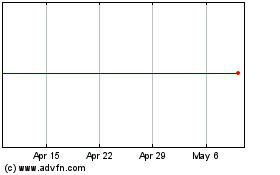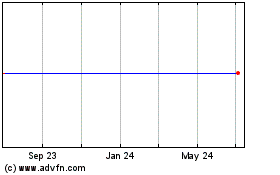US Supreme Court To Weigh Constitutionality of FCC Indecency Rules
June 27 2011 - 10:46AM
Dow Jones News
The U.S. Supreme Court said Monday it will decide the
constitutionality of the Federal Communications Commission's rules
prohibiting indecent broadcasts, a major test of the agency's
ability to police the airwaves.
The case returns to the high court for the second time in three
years. A divided court ruled for the FCC on narrow grounds in 2009,
finding the agency's stepped-up efforts to combat indecency were a
legally permissible exercise of the agency's administrative
powers.
The case now returns for an answer to the larger question of
whether the FCC's restrictions on broadcasters' speech violates the
First Amendment.
The agency took a tougher stance toward broadcasters beginning
in 2004, indicating that networks could face fines for airing even
fleeting uses of profanity.
One case before the court involves Fox Television broadcasts of
the 2002 and 2003 Billboard Music Awards in which Cher and Nicole
Richie uttered expletives. Another case involves ABC's airing of a
2003 episode of "NYPD Blue" that depicted a woman's naked
buttocks.
The FCC found Fox was in violation of indecency prohibitions,
but did not sanction the network because the programs aired before
the agency's revised policy.
Fox is a division of News Corp. (NWS, NWS.AU, NSSA), which also
owns The Wall Street Journal and Dow Jones Newswires.
In the "NYPD Blue" case, the agency fined 45 ABC network-owned
or affiliated stations that aired the episode.
The New York-based 2nd U.S. Circuit Court of Appeals ruled last
year that the FCC rules violated broadcasters' constitutional
free-speech rights. The appeals court said the rules are so vague
that they don't give broadcasters fair warning of what constitutes
a violation.
The case could give the Supreme Court the opportunity to revisit
its earlier rulings that formed the basis for government curbs on
indecent broadcast speech, including a famous 1978 decision that
allowed the FCC to fine a radio station for broadcasting a
monologue on dirty words by the late comedian George Carlin.
The networks argue that the justifications for the earlier
rulings no longer exist because of major changes in the media
landscape, including the prevalence of cable television and
Internet video sites, which don't face the same restrictions as
over-the-air broadcasters.
The case is FCC v. Fox Television Stations, 10-1293. The court
will hear oral arguments during its next term, which begins in
October.
-By Brent Kendall, Dow Jones Newswires; 202-862-9222;
brent.kendall@dowjones.com
CBS (NYSE:CBS)
Historical Stock Chart
From May 2024 to Jun 2024

CBS (NYSE:CBS)
Historical Stock Chart
From Jun 2023 to Jun 2024
